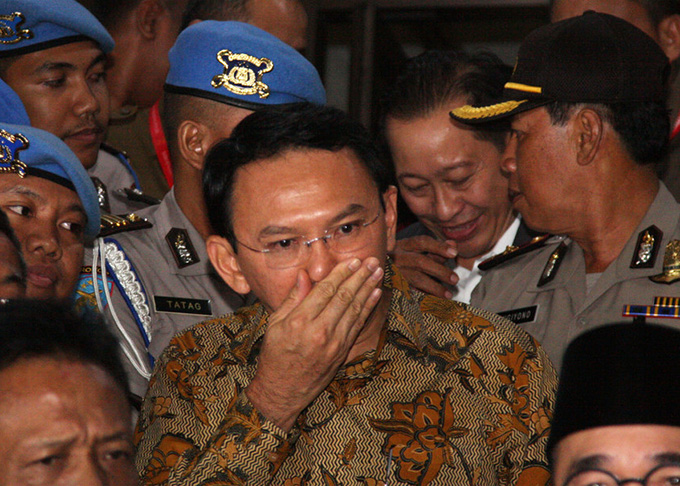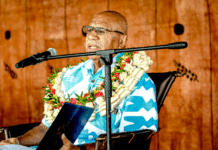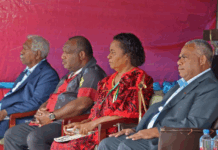
By Muhamad Al Azhari and Eko Prasetyo in Jakarta
Incumbent Jakarta Governor Basuki “Ahok” Tjahaja Purnama’s defeat at the hands of rival candidate Anies Baswedan in the recent runoff election raised alarms among many observers that Indonesia’s young democracy still has a long way to go in combating religious and ethnic discrimination.
However, the capital was calm in the evening after the nail-biting election last month, defusing fears among some residents that mass gatherings or rallies would consume city streets during and in the wake of Wednesday’s vote.
READ MORE: ASEAN lawmakers alarmed at ‘blasphemy’ conviction of Ahok
Investors seemed relieved as well, as the country’s benchmark stock index dropped only slightly the day after the election, with businessmen observing that risks or uncertainties in Indonesian markets were largely dispelled due to the peaceful election turnout.
Indeed, more relief came later in the week, as state prosecutors pushed for reduced charges in a blasphemy case against Jakarta’s first ethnic Chinese and Christian leader in the post-Suharto era.
However, this came to nought when the trial judges ignored the prosecutors and imposed a harsher sentence of two years’ imprisonment on Ahok after finding him “guilty”.
However, rhetoric and methods used by politicians in defeating Ahok have nevertheless raised concerns among local and foreign political observers concerned about the future for democracy in the world’s largest Muslim-majority nation.
Stigma
Poet and senior journalist Goenawan Mohamad wrote a comment on his official Facebook account analysing what the defeat of Ahok – an outspoken governor who often drew ire from his political opponents – could mean for the path ahead.
“Ahok has lost; this has now been settled by the 2017 regional election. All that noise surrounding it will soon become history. Many are relieved ¬ either because Anies has won, or because the campaign, poisoned with hate that shattered many friendships, has finally passed,” said the former editor-in-chief of investigative magazine Tempo.
“But I hope one thing will not be forgotten. Ahok has entered the arena bound in fetters and labeled as ‘a blasphemer’. He can move and talk, but he is not entirely free.
“His achievements as the region’s head, which have been acknowledged by many and made him unparalleled, are now almost no longer seen or heard of.
“The use of the label against Ahok is probably the most successful stigmatisation technique in the history of Indonesian politics. A stigma derived from slander. He did not insult Islam, but the charge had been continuously repeated.
“If you repeat a lie often enough, it becomes ‘the truth,’ the Nazi’s propaganda chief used to say. We hear it at mosques, in social media, in everyday conversations; the allegation has been turned into a conviction,” Goenawan said.
“Now Ahok is tried by the court, charged under the anti-blasphemy law that was produced by the New Order regime ¬ a law with unclear provisions, unclear even on who has the right to represent the religion that had been insulted. As a result of it, Ahok has been treated unjustly in three ways: through slander, by being presumed guilty before the court’s verdict and by being tried under a dubious law.
“It is hypocritical to pretend to recognise this injustice while cheering his immutable political defeat. Ahok has lost, he may even be sentenced in a court process informed by mass pressure. The truth may also lose ¬ as it is wont to do in this ‘post-truth’ era,” Goenawan said.
Identity politics
Concerns over the future of democracy in the Southeast Asian country were shared by foreign observers as well.
Reuters news agency reported that international rating agency Fitch said in a statement previous religious tensions during the Jakarta gubernatorial election could resurface in the run-up to the country’s next presidential race in 2019.
“The early results of the tense Jakarta elections seem to suggest that religious factors could play an increasingly significant role in future Indonesian elections,” the statement said, as cited by Reuters.
Three mass rallies against Ahok were led by hardline Muslim groups in the campaign period before last week’s vote, threatening to erode the country’s longstanding tradition of practising a moderate form of Islam.
However, the rating agency still acknowledged Indonesia’s recent progress, explaining that the country has made “substantial” strides in improving good governance over the past two decades. The country’s democratic electoral processes, the statement said, were still intact.
Still, experts and academics around the world say that religious and ethnic discrimination should be expected to play a greater role in future elections if the government and high-ranking Muslim figures do not take significant steps to promote tolerance.
“Going forward, the politics of religion is going to be a potent force,” Keith Loveard, an analyst at Jakarta-based Concord Consulting and an author of books about Indonesian politics, said in a report on Wednesday.
Reluctant to vote
According to Loveard, some residents may have been reluctant to vote for Ahok due to worries of “five more years of protests on the streets by Muslim hardliners”.
Muhammad Najib Azca, a professor of social and political sciences at Gadjah Mada University in Yogyakarta, viewed religious and ethnic intolerance as a driving factor in the election’s outcome.
“What happened in Jakarta was an anomaly. Ahok and Djarot were unable to translate their high approval rating […] into real political support,” Najib said.
“There were variables beyond public approval ratings, including strong undertones of religious-based identity politics,” he added.
Najib argued that identity politics has become a main force in driving public opinion, even in the face of successful governance programmes directed by Ahok. “This intervening variable has affected voters through a very sophisticated and elaborate political process.”
Ian Wilson, a lecturer in politics and security studies and a Research Fellow at Murdoch University’s Asia Research Center, said – in an article published by newmandala.org – the election results will most likely have a lasting impact on national politics for years to come.
“Judging from national and international headlines, Jakarta’s gubernatorial election on April 19 represents not just a major turning point for the nation’s capital and city of 12 million, but potentially for the entire country,” he wrote.
“The alarmist tone is largely due to the unsettling direction campaigning has taken over the past eight months, that has seen any possible substantive policy debates over how to best tackle Jakarta’s complex infrastructural, economic and social problems subsumed by sectarian identity politics.”
Economic inequality
Wilson, whose research touches on the political economy of gangs, organised crime and violence in Indonesia, went on to say that: “While the campaigns present, at one level of analysis, a stark contrast between ‘diversity’ on the one hand and sectarian populism on the other, a shared point of commonality is the respective silence regarding a significant shaping force in Jakarta, and arguably the election: rising levels of economic inequality.”
He pointed to data from the country’s Bureau of Statistics – which shows a steady increase in levels of economic inequality in Jakarta – that reflects a broader trend that has been sweeping the nation over the past decade.
“The country’s much-heralded economic growth has been marked by growing concentrations of that wealth in the hands of a few, and a stagnation if not deterioration in the standard of living of a vast majority of Indonesians,” he said.
Wilson also pointed to a 2017 Oxfam report on the widening wealth gap in Indonesia, in which “inequality has been driven by a combination of ‘market fundamentalism,’ high concentrations of land ownership,” and the fact that Indonesia registered the second lowest rate of tax collection in Southeast Asia.
“The poor and precarious bear the most drastic and damaging impacts of economic inequality, though in a densely populated megacity like Jakarta, it is felt by all social and economic classes ¬ albeit in often vastly different ways and with a range of social and political consequences,” he said.
Wilson continued, “For Jakarta’s upper middle classes the desire for security, lifestyle and convenience ¬ together with the push by developers for profitable all-inclusive developments ¬ has meant increasingly self-imposed spatial separation from other social and economic groups within gated estates, apartment towers, shopping malls and private vehicles.”
“Once a city of economically mixed neighborhoods, large parts of the city are spatially divided by class and ethnicity. This can be seen in the city’s north, where remaining kampung sit in uneasy tension alongside luxury apartments and gated communities,” Wilson said.
Old political and business elites emerge
For President Joko “Jokowi” Widodo, the election outcome poses a new challenge of rising Islamism and the renewed influence of Indonesia’s old political and business elites in the public sphere.
Many old guard figures have shown support for Anies during the election campaign, including moguls Aburizal Bakrie, Hashim Djojohadikusumo and Hary Tanoesoedibjo and retired general and failed 2014 presidential candidate Prabowo Subianto.
All were prominent businessmen or military officers linked to the three-decade authoritarian regime of Suharto before his ouster in 1998.
Reconciliation
While Jakarta remains hampered by a dizzying array of social and political hurdles, scholar Komaruddin Hidayat, dean of Syarif Hidayatullah State Islamic University in Banten, Jakarta, called on city residents to eliminate any racial, religious or ethnic intolerance.
“We should eliminate the notion of majority and minority, and the government should establish a way to bridge any gaps through the improvement of people’s welfare,” Komaruddin said.
Komaruddin, a widely known liberal Muslim scholar and author of several books on religious diversity, said minority groups in Indonesia have existed long before the country achieved independence in 1945-48 and have worked hard to personify the ideals of the state ideology, Pancasila.
“Therefore, they should be granted equality in our society and government,” he said.
Indeed, Ahok is not the first Chinese Christian governor of Jakarta. From 1964-65, Hendrik Hermanus Joel Ngantung, known as Henk Ngatung, served as the capital’s chief executive and was instrumental in installing artistic statues and monuments throughout the city as befitted his status as one of the country’s leading painters at that time.
Various reports show that ethnic Chinese, who currently comprise about 15 percent of the country’s population, have historically fought alongside local freedom fighters, known as pribumi, against the Dutch – Indonesia’s colonial masters – and the Japanese.
Sadly, their participation in building modern Indonesia has been expunged from the country’s historical consciousness.
Muhamad Al Azhari and Eko Prasetyoare journalists with the Jakarta Globe. This article includes some news agency content.











































